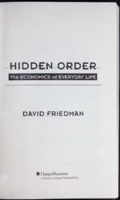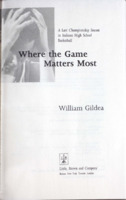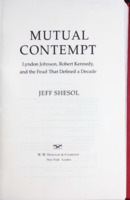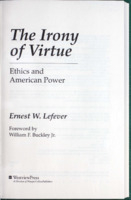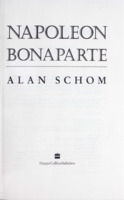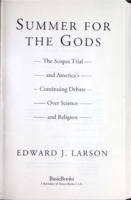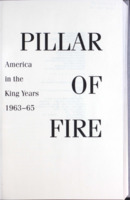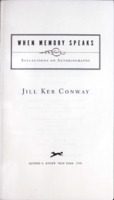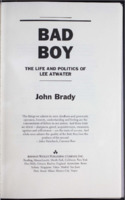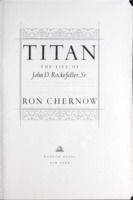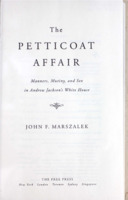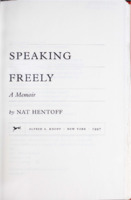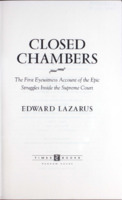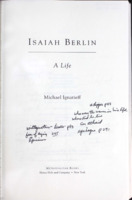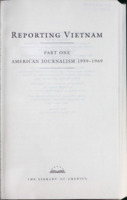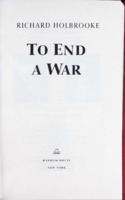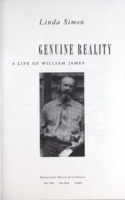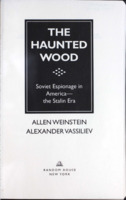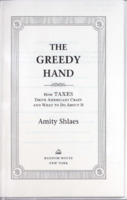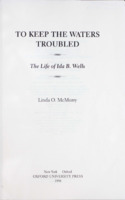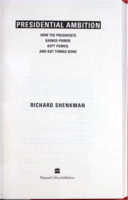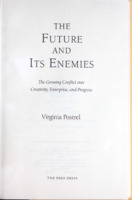Search
540 items
-
Hidden order: the economics of everyday life.
David D. Friedman demonstrates how economics can be used to understand all aspects of human behavior. -
Where the game matters most: a last championship season in Indiana high school basketball.
An account of Indiana high school basketball. -
Mutual contempt: Lyndon Johnson, Robert Kennedy, and the feud that defined a decade.
An account of the relationship between Lyndon Johnson and Robert Kennedy. -
The irony of virtue: ethics and American power.
An anthology of articles by Ernest Lefever. -
Napoleon Bonaparte.
A biography of Napoleon Bonaparte. -
Summer for the Gods: the Scopes trial and America's continuing debate over science and religion.
Draws from new archival material, as well as historical and legal analysis to examine the many facets of the Scopes trial of 1925 in which the American Civil Liberties Union challenged a controversial Tennessee law banning the teaching of evolution in public schools, and considers the impact of that trial on the continuing debate between religion and science. -
Pickett's charge in history and memory.
In this book, Reardon shows that the story told today of Pickett's Charge is really an amalgam of history and memory. The evolution of that mix, she concludes, tells us much about how we come to understand our nation's past. -
Pillar of fire: America in the King years, 1963-65.
An account of the Civil Rights era. -
When memory speaks: reflections on autobiography.
Discusses the import of autobiographies. -
Bad boy: the life and politics of Lee Atwater.
A biography of Lee Atwater. -
Titan : the life of John D. Rockefeller, Sr.
A biography of America's first billionaire, John D. Rockefeller, Sr., drawing from Rockefeller's personal papers to provide information about his rustic origins, his creation of Standard Oil, his often controversial business tactics, and his personal relationships and attributes. -
Defending the spirit : a Black life in America.
Memoirs of activist, Randall Robinson. -
The petticoat affair: manners, mutiny, and sex in Andrew Jackson's White House.
Details the Andrew Jackson administration. -
Speaking freely : a memoir.
A memoir by activist, Nat Hentoff. -
Closed chambers : the first eyewitness account of the epic struggles inside the Supreme Court.
Edward Lazarus details his experiences as a clerk to Supreme Court Justice, Hugo Black. -
Isaiah Berlin : a life.
Isaiah Berlin was witness to a century. Born in the twilight of the Czarist empire, he lived long enough to see the Soviet state collapse. The son of a Riga timber merchant and the first Jew elected to a fellowship at All Souls, Oxford, he was a presiding judge of intellectual life on both sides of the Atlantic for sixty years: historian of the Russian intelligentsia, biographer of Marx, scholar of the Romantic movement, and defender of the liberal idea of freedom against Soviet tyranny. When he died in 1997, he was hailed as the most important liberal philosopher of his time. "But Berlin's life was not only a life of the mind. Present at the crucial events of our age, he was in Washington during World War II, in Moscow at the dawn of the Cold War, in Israel as the new state came into being." "For this definitive biography - the result of a remarkable ten-year collaboration between biographer and subject - Michael Ignatieff, himself a leading public intellectual, interviewed Berlin extensively and was granted complete access to his papers, one of the largest archives in Anglo-American cultural history. Ignatieff charts the emergence of a unique liberal temperament - serene, comic, secular, and unafraid - and he examines its influence on Berlin's vision of liberalism, which stressed the often tragic nature of political and moral choice."--BOOK JACKET. -
John Quincy Adams : a public life, a private life.
Biography of John Quincy Adams. Adams' career included being president, senator, representative, secretary of state, and ambassador. -
Reporting Vietnam.
Volume 1 includes interviews and reportage by Neil Sheehan, David Halberstam, Russell Baker, Meg Greenfield, Martha Gellhorn, Ward Just, Tom Wolfe, Mary McCarthy, Seymour Hersh, Francine du Plessix and others.Volume 2 includes reportage by Seymour Hersh, Francine du Plessix Gray, John Saar, Gloria Emerson, Sydney Schanberg, Flora Lewis, Peter Arnett, and others. -
The greatest generation
In this book, Tom Brokaw goes out into America, to tell through the stories of individual men and women the story of a generation, America's citizen heroes and heroines who came of age during the Great Depression and the Second World War and went on to build modern America. This generation was united not only by a common purpose, but also by common values - duty, honor, economy, courage, service, love of family and country, and, above all, responsibility for oneself. In this book, you will meet people whose everyday lives reveal how a generation persevered through war, and were trained by it, and then went on to create interesting and useful lives and the America we have today. -
To end a war
Richard Holbrooke's account of the negotiations to end the Balkan War. -
Genuine reality : a life of William James
This first full biography of William James in nearly a generation brings us the man alive in all his complexity. Intellectual rebel, romantic pragmatist, aristocratic pluralist, James was both a towering figure of the nineteenth century and a springboard into the twentieth. Constitutionally opposed to the rigidity and stability of the nineteenth century, James guided his generation toward the ambivalence, unpredictability, and indeterminacy of the times that followed. His explorations of pluralism and pragmatism nurtured ideas that continue to shape our society. Profiting from a rich range of sources, among them 1,500 letters written between James and his wife, Alice, Linda Simon creates an intimate portrait of this multifaceted and contradictory man. -
The wreck of the Henrietta Marie : an African-American's spiritual journey to uncover a sunken slave ship's past
The author offers an account of the slave ship Henrietta Marie and its role in his ancestors' history. -
The haunted wood : Soviet espionage in America--the Stalin era
Based upon Previously Secret KGB records, The Haunted Wood reveals for the first time the riveting story of Soviet espionage's golden age" in the United States throughout the 1930s, World War II, and the early Cold War. Historian Allen Weinstein, author of Perjury: The Hiss-Chambers Case, and Alexander Vassiliev, a former KGB agent-turned-journalist, were provided unique access to thousands of classified Soviet intelligence dispatches that documented the KGB's success in acquiring America's most valuable atomic, military, and diplomatic secrets. The Haunted Wood narrates the triumphs and failures of Soviet operatives and their American agents during the 1930s and 1940s, describing as well the compelling human dramas involved." "Several chapters provide major new accounts from Moscow's own record of its relations with Alger Hiss and atomic spies Klaus Fuchs, Harry Gold, David Greenglass, Theodore Hall, and Julius Rosenberg, among others, along with fresh information on Soviet espionage in the United States by British agents for the Kremlin - Guy Burgess, Donald Maclean, and Harold "Kim" Philby."--BOOK JACKET. -
The greedy hand : how taxes drive Americans crazy and what to do about it
A look into the taxes we pay, what they are for and how to change the laws effectively for our benefit. -
To keep the waters troubled : the life of Ida B. Wells
In the generation that followed Frederick Douglass, no African American was more prominent, or more outspoken, than Ida B. Wells. Her crusade against lynching in the 1890s made her famous, or notorious, across America, and she was seriously considered as a rival to W.E.B. Du Bois and Booker T. Washington for race leadership. This book is the first full biography of Wells, a passionate crusader for black people and women - and one who was sometimes torn by her conflicting loyalties to race and gender. -
Presidential ambition : how the presidents gained power, kept power, and got things done
Combining a potent narrative with persuasive and compelling insights, Shenkman reveals that it is not just recent presidents who have been ambitious - and at times frighteningly overambitious, willing to sacrifice their health, family, loyalty, and values as they sought to overcome the obstacles to power - but that they all have. This volcanic ambition, Shenkman shows, has been essential not only in obtaining power but in facing - and attempting to master - the great historical forces that have continually reshaped the United States, from Manifest Destiny and Emancipation to immigration, the Great Depression, and nuclear weapons.As Shenkman describes the lives and careers of the most representative and colorful presidents from Washington to Nixon, he shows that those who succeeded in reaching the White House, whatever their flaws, were complicated human beings, idealistic as well as ambitious. Over time, however, they began to make increasingly troubling compromises, leading to a decline in the moral tone of American politics.What drove politics downward? In a stunning conclusion, Shenkman demonstrates that it wasn't a decline in presidential character that was responsible, but change - the dramatic transformation of the United States from a country of four million in Washington's day to more than a quarter billion today - that made running the country more complicated and difficult. Instead of things getting better and better they got worse and worse as people became used to increasingly promiscuous political practices. -
Embracing defeat : Japan in the wake of World War II
Discusses how the defeat and American military occupation of Japan after World War II affected each level of Japanese society. -
Walking on water: Black American lives at the turn of the twenty-first century.
Randall Kenan's depictions of African American life. -
The future and its enemies : the growing conflict over creativity, enterprise, and progress
Looking ahead into the next century, the author predicts a conflict between advocates of bureaucracy and the status quo and advocates of competition and choice. -
1863 : the rebirth of a nation
Drawing from personal letters, official documents, and rare photographs, the author offers a look at the "tumultuous" 1863 and all the personalities of the year.
